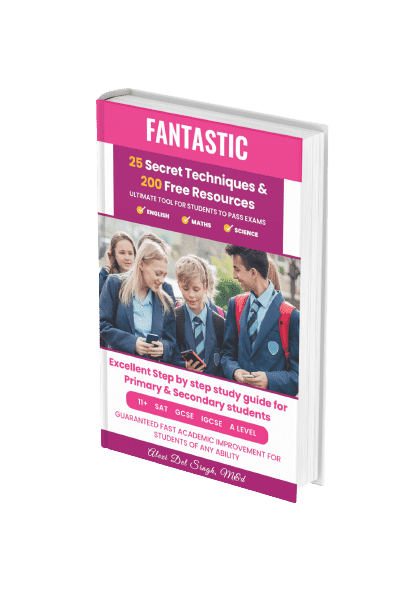Are you feeling anxious about an upcoming exam? Don’t worry, we’ve got you covered with some valuable exam preparation tips. From GCSE Maths to Algebra, Geometry, and Trigonometry, we’ll help you navigate through various subjects and concepts. Discover effective study strategies, exam techniques, and revision tips to boost your confidence. With our curated curriculum guide, practice questions, and maths resources, you’ll be well-equipped to tackle any problem. Learn how to solve quadratic equations, understand mathematical concepts, and enhance your critical thinking and numeracy skills. Don’t let exam anxiety get the best of you – we’ll also share tips on time management and how to effectively use educational technology to your advantage. Get ready for success and ace your exams with our comprehensive exam preparation advice! Exam Preparation
Preparing for exams can be a daunting task, but with the right strategies and resources, you can feel confident and well-prepared. In this article, we will explore various tips and techniques to help you excel in your exams. From revision tips to study strategies, we’ve got you covered.
Revision Tips
Create a Study Schedule
One of the most effective ways to ensure productive revision is by creating a study schedule. This schedule will help you allocate time to different subjects or topics, ensuring you cover all the necessary material. Be realistic when planning your schedule and set aside regular study sessions to maintain consistency.
Break Up Your Study Sessions
Rather than cramming for long hours each day, it is advisable to break up your study sessions. Our brains have a limited capacity for focused attention, so taking short breaks in between sessions can help improve concentration and retention. Try studying for 25-30 minutes and then taking a 5-10 minute break before resuming.
Review Past Material
To reinforce your understanding and build upon previous knowledge, it is essential to review past material regularly. This will help you refresh your memory and identify any areas that may need further attention. By dedicating time to review, you can ensure that all relevant content is solidified in your mind.
Use Flashcards or Mnemonic Devices
Flashcards and mnemonic devices can be valuable tools for memorization. Create flashcards for key terms, formulas, or concepts and review them regularly. Mnemonic devices, such as acronyms or vivid mental images, can also help you remember information more effectively. These techniques make the learning process more engaging and interactive.
Teach Someone Else the Material
Teaching someone else the material is an excellent way to reinforce your understanding and test your knowledge. By explaining concepts or problems to someone else, you are forced to articulate your thoughts clearly and identify any gaps in your understanding. This approach also boosts your confidence and helps you retain information more effectively.
Exam Techniques
Read the Instructions Carefully
Before starting any exam, take the time to read through the instructions carefully. Pay attention to any specific requirements, such as word limits or question formats. A thorough understanding of the instructions will help you approach the exam with clarity and certainty.
Manage Your Time Effectively
Time management is crucial during exams to ensure that you answer all the questions within the allocated time. Break down your time based on the number of questions and their weightage. Allocate more time to questions that carry more marks while ensuring you have sufficient time for all sections. Regularly check the clock to stay on track.
Answer Easier Questions First
Starting with easier questions can help build momentum and boost your confidence as you progress through the exam. By answering familiar and less challenging questions first, you can secure those marks and gain a sense of accomplishment. This approach also helps you manage your time effectively, ensuring that you have enough time for more complex questions.
Understand Key Terms and Command Words
Many exam questions are carefully phrased, and understanding the key terms and command words is crucial. Pay attention to words like “analyze,” “compare,” or “evaluate,” as they require different types of responses. Familiarize yourself with these terms during your preparation to ensure that you address each question appropriately.
Practice Under Timed Conditions
Practicing under timed conditions is essential to simulate the exam environment and get accustomed to working under pressure. Set a timer and attempt practice questions or past papers within the time limits. This will not only improve your speed but also help you develop effective time management strategies.

Study Strategies
Organize Your Study Materials
Keeping your study materials organized is key to efficient studying. Have a separate folder or binder for each subject to avoid confusion. Within each folder, divide your notes and resources into subtopics or chapters. This organization will make it easier to locate specific information when you need it.
Find a Quiet and Comfortable Study Space
Creating an ideal study environment is crucial for effective learning. Find a quiet place where you can concentrate without distractions. Ensure that the lighting is adequate, and the temperature is comfortable. Everyone has different preferences, so experiment and find what works best for you.
Take Breaks During Study Sessions
Studying for long stretches without breaks can lead to burnout and reduced productivity. It is important to take regular breaks during study sessions to relax your mind and recharge. Step away from your study space, stretch, grab a healthy snack, or engage in a quick physical activity. These breaks will help you stay focused and energized.
Utilize Different Learning Techniques
People have different learning preferences, and it’s essential to tailor your study techniques to your individual style. Visual learners may benefit from using diagrams, charts, or mind maps. Auditory learners can try recording themselves reciting key information or explaining concepts out loud. Kinesthetic learners may find it helpful to use hands-on activities or create physical models. Experiment with different techniques and incorporate them into your study routine.
Join Study Groups or Form Study Partnerships
Studying with peers can be highly beneficial as it provides an opportunity for discussion, collaboration, and clarifying doubts. Joining study groups or forming study partnerships allows you to learn from others, gain new perspectives, and share your own knowledge. Together, you can tackle challenging concepts and hold each other accountable.
Curriculum Guide
Understand the Exam Format and Structure
Before diving into your exam preparation, it is important to thoroughly understand the format and structure of the exam. Familiarize yourself with the types of questions, the time allocation for each section, and the overall weightage of different topics. This understanding will help you prioritize your studying and allocate appropriate time to each area.
Identify Key Topics and Concepts
Identifying key topics and concepts is crucial for comprehensive exam preparation. Review your syllabus or curriculum guide to gain a clear understanding of the material that will be covered. Prioritize topics that carry more weightage or those in which you feel less confident. This targeted approach will ensure that you cover all essential content before the exam.
Create a Checklist of Learning Objectives
Creating a checklist of learning objectives can help you track your progress and ensure that you have covered all necessary topics. Divide your checklist based on different chapters or sections of the curriculum. As you study and understand each objective, mark it off your list. This visual representation of your progress can be motivating and provide a sense of accomplishment.
Refer to the Syllabus or Curriculum Guide
The syllabus or curriculum guide provided by your educational institution is a valuable resource for exam preparation. It outlines the learning outcomes, topics, and concepts that will be assessed. Regularly referring to the syllabus will help you stay focused on the relevant material and avoid wasting time on unnecessary topics.
Consult with Teachers or Tutors for Clarification
If you have any doubts or require further clarification on certain topics, don’t hesitate to reach out to your teachers or tutors. They are there to support your learning journey and can provide valuable insights and explanations. Asking questions and seeking clarification will ensure that you have a clear understanding of the material.

Practice Questions
Access Past Exam Papers
Accessing past exam papers is an effective way to familiarize yourself with the types of questions that may appear in your upcoming exam. These papers provide insight into the format, difficulty level, and areas of emphasis. Practice answering these questions to gain confidence and improve your exam performance.
Complete Practice Questions from Textbooks or Online Resources
In addition to past exam papers, utilize practice questions from textbooks or online resources. These questions often provide detailed explanations and allow you to practice specific skills or concepts. Regular practice will not only improve your understanding but also enhance your problem-solving abilities.
Utilize Revision Guides with Practice Exercises
Revision guides are valuable resources that summarize important topics and provide practice exercises. These guides often contain concise explanations, examples, and practice questions. Utilize them to reinforce your understanding, test your knowledge, and identify areas that need additional focus.
Seek Feedback on Your Answers
After attempting practice questions or past papers, seek feedback on your answers. This feedback can come from teachers, tutors, or study partners. Analyze your mistakes or areas of improvement and reflect on how you can enhance your response. This process will help you refine your approach and avoid similar errors in the future.
Identify Areas for Improvement
Regularly evaluate your performance in practice questions to identify areas for improvement. If you consistently struggle with certain types of questions or concepts, dedicate more time and effort to those areas. By targeting your weaknesses, you can turn them into strengths and maximize your overall exam performance.
Maths Resources
Utilize Textbooks and Study Guides
Textbooks and study guides are core resources for studying mathematics. These resources provide comprehensive explanations, examples, and practice problems. Utilize them to build a strong foundation in mathematical concepts and develop problem-solving skills.
Access Online Educational Platforms and Websites
Online educational platforms and websites offer a wealth of resources for learning mathematics. They provide interactive lessons, videos, quizzes, and practice exercises. Explore these platforms to find engaging and comprehensive materials that suit your learning style.
Use Instructional Videos and Tutorials
Instructional videos and tutorials can be highly beneficial for visual learners. Platforms like Khan Academy offer a wide range of video lessons covering various math topics. These videos break down complex concepts into easy-to-understand explanations, making math more accessible and enjoyable.
Explore Interactive Math Apps and Games
Engaging with math through interactive apps and games can make the learning process more enjoyable. There are numerous math apps and games available that cover different topics and provide interactive challenges. These apps and games can enhance your problem-solving skills while keeping you entertained.
Refer to Math Reference Books or Formula Sheets
Math reference books or formula sheets can serve as handy resources during exam preparation. These books provide quick reference to key formulas, concepts, and problem-solving techniques. Having access to these resources will save you time and help you recall important information during the exam.
Problem Solving
Practice Solving a Variety of Math Problems
Problem-solving is a crucial skill in mathematics, and the best way to improve is through practice. Solve a variety of math problems, ranging from straightforward to complex. This will sharpen your logical reasoning and analytical skills while exposing you to different problem-solving strategies.
Break Down Complex Problems into Smaller, Manageable Steps
Complex math problems can be overwhelming, but breaking them down into smaller, manageable steps can make them more approachable. Analyze the problem, identify the given information, and determine what the question is asking. Then, break the problem down into smaller parts, solving each part systematically. This step-by-step approach will help you tackle even the most challenging problems.
Develop Problem-Solving Strategies and Techniques
Developing problem-solving strategies and techniques can significantly improve your math skills. These strategies may include drawing diagrams, using algebraic manipulation, or applying logical reasoning. Experiment with different approaches and identify the strategies that work best for you. With practice, these techniques will become second nature, making problem-solving more efficient.
Identify Patterns or Similarities in Different Types of Problems
Many math problems share similar underlying principles or patterns. By identifying these patterns, you can apply the same problem-solving approach to a range of different problems. Look for recurring elements, relationships, or formulas that appear across various types of questions. This recognition will save you time and enable you to solve problems more confidently.
Seek Assistance or Guidance When Facing Challenging Problems
It’s natural to encounter challenging problems that may stump you at times. When faced with such situations, don’t hesitate to seek assistance or guidance. Consult your teacher, a tutor, or fellow students to get different perspectives and insights. Sometimes, a fresh approach or explanation can make all the difference in understanding and solving a difficult problem.
Tutoring Success
Seek Professional Tutoring or Academic Support
If you find yourself struggling with certain math concepts or need additional guidance, consider seeking professional tutoring or academic support. Tutors can provide tailored instruction and address your specific learning needs. They can help clarify difficult topics, reinforce foundational knowledge, and guide you in developing effective study strategies.
Communicate Your Goals and Areas of Difficulty with the Tutor
Effective communication with your tutor is crucial for productive tutoring sessions. Clearly articulate your goals and areas of difficulty at the beginning of your tutoring journey. By doing so, your tutor can customize the sessions to target your specific needs and help you overcome challenges.
Attend Tutoring Sessions Regularly
Consistency is key when it comes to tutoring success. Attend tutoring sessions regularly and maintain a dedicated schedule. Regular sessions will allow you to build on previous knowledge, reinforce understanding, and receive ongoing support. Treat your tutoring sessions as valuable learning opportunities and come prepared with questions or topics you’d like to address.
Collaborate with the Tutor to Create a Personalized Study Plan
Collaborating with your tutor to create a personalized study plan is an effective way to maximize your progress. Discuss your learning objectives, exam timeline, and preferred study techniques with your tutor. Together, you can develop a study plan that incorporates targeted practice, review sessions, and periodic assessments to track your improvement.
Ask Questions and Actively Participate in the Tutoring Process
Active participation is crucial for successful tutoring. Don’t hesitate to ask questions, seek clarification, and engage in meaningful discussions with your tutor. Actively participate in solving problems, explaining concepts, and reflecting on your progress. Your involvement in the tutoring process will deepen your understanding and promote active learning.
Online Learning
Explore Online Math Courses or Tutorials
Online math courses or tutorials provide a flexible and accessible way to learn at your own pace. Many reputable platforms offer math courses designed for various levels and topics. Explore these courses to enhance your understanding of mathematical concepts, reinforce problem-solving skills, and gain confidence in your abilities.
Engage in Virtual Learning Communities or Forums
Virtual learning communities or forums provide opportunities to connect with other learners and math enthusiasts. Joining these communities allows you to share experiences, ask questions, and gain insights from a diverse group of individuals. Engaging with peers who are also passionate about math can foster motivation and provide additional support.
Participate in Online Quizzes and Interactive Exercises
Online quizzes and interactive exercises can be valuable tools for self-assessment and reinforcement. Many websites and platforms offer quizzes that cover a range of math topics, allowing you to gauge your understanding and track your progress. Engaging in these activities regularly will help you identify areas that need further focus and build confidence.
Access Online Resources for Additional Practice
In addition to textbooks and practice books, access online resources for additional practice materials. Websites, blogs, and educational platforms often provide free or low-cost resources, such as worksheets, example problems, and interactive exercises. These resources can complement your regular study materials and provide a fresh perspective on challenging topics.
Utilize Educational Apps and Platforms
With the advent of educational technology, there are several math-specific apps and platforms available to support your learning journey. These apps provide interactive lessons, games, and quizzes designed to make math engaging and enjoyable. Incorporate these educational apps into your study routine to reinforce concepts and improve your problem-solving skills.
Past Papers
Access and Review Previous Exam Papers
Accessing and reviewing previous exam papers is an excellent way to familiarize yourself with the exam format and style. Analyze the questions and types of problems that appear frequently. Pay attention to the marking schemes and understand the expectations for each question. This analysis will assist you in structuring your answers effectively.
Understand the Format and Style of Past Exams
Each exam has its own unique format and style. By understanding these aspects, you can tailor your preparation to match the exam requirements. Pay attention to the types of questions asked, the distribution of marks, and any specific instructions provided. Aligning your study approach with the exam format will increase your chances of success.
Attempt Past Paper Questions under Timed Conditions
Attempting past paper questions under timed conditions is crucial for exam preparation. Set a timer and challenge yourself to complete the questions within the allocated time. This exercise will help you practice time management and improve your speed without compromising accuracy. Regular practice under timed conditions will contribute to your exam-readiness.
Analyze and Learn from Past Paper Solutions
After attempting past paper questions, compare your solutions with the provided answers or marking schemes. Identify any mistakes, misconceptions, or areas that need improvement. Analyzing the solutions will help you understand the expected approach, identify common errors, and refine your problem-solving skills.
Identify Common Question Patterns and Topics
Analyzing past papers helps you identify common question patterns and topics that frequently appear in exams. By recognizing these patterns, you can allocate more time and focus to these topics during your preparation. This strategic approach will ensure that you have a strong foundation in areas that are likely to be assessed in your upcoming exam.
In conclusion, effective exam preparation requires a combination of revision tips, exam techniques, study strategies, and access to resources. By creating a study schedule, breaking up study sessions, and reviewing past material, you can solidify your understanding. Utilizing flashcards, teaching others, and joining study groups are effective study strategies. Understanding the exam format, identifying key topics, and practicing past papers are essential for success. Accessing math resources, utilizing problem-solving strategies, and seeking tutoring support can enhance your preparation. Finally, online learning, utilization of past papers, and participation in virtual learning communities can further boost your confidence and exam performance. With these comprehensive strategies, you are well-equipped to tackle your exams with confidence and achieve success. Good luck!





